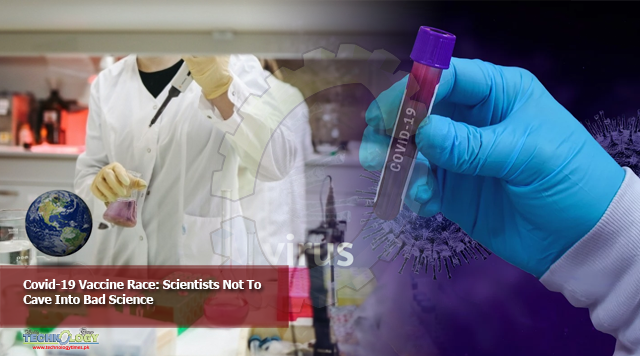In a desperate race to develop a Covid-19 vaccine, it is tempting for scientists to compromise quality control and rigour. But crises are not an excuse for lowering the bar of stringent ethical and scientific standards. Ethicists have warned scientists not to cave into bad science. Can permitting volunteers to be purposely infected with COVID-19 vaccine Race be done ethically?

Yes, according to Adair D. Richards, of the University of Warwick, in the UK. This sounds disturbing and reminds us of past ethical disasters, e.g. the Tuskegee study of untreated syphilis amongst poor African-American men in Georgia in the 1930s.
In recent research, Dr Richards designed ethical guidelines to guide researchers on an ethical path to purposely infect participants who have been provided with a vaccine candidate with Covid-19 (known as ‘challenge studies’).
The volunteers who are vaccinated are given a dose of the virus so the scientist can determine whether the vaccine works. This experiment may accelerate vaccine development that could save numerous lives. He argues that adhering to these new guidelines will ensure that the study is conducted ethically.
Currently, numerous vaccine candidates are undergoing human safety testing all over the world. In testing its efficacy, it is necessary to discover what happens when a vaccinated individual is exposed to Covid-19.
He stated that deliberately infecting volunteers with a disease as dangerous as Covid-19 has previously been regarded to be not ethical by the scientific community. But speeding up the process of vaccine development could result in saving many lives.
Dr Richards adds that it is not appropriate to rule out human challenge experiments completely as unethical in relation to Covid-19 vaccine development. The present pandemic is unusual and different to those already encountered. In this scenario, it is arguably justifiable and also ethical to take certain risks.
He explained that in many aspects of life, it is not unusual for society to allow people to do things that would place them at risk, e.g. smoking or riding a motorbike or engaging in a job like soldiers and astronauts.
In his study, Dr Richards analyses the standard arguments against these kinds of experiments, including the risk of harm to volunteers, the risk of developing an ineffective vaccine and the lack of robustness of a volunteer’s informed consent.
He argues that these concerns can be addressed. He claims that we do not need to lower the bar of ethical standards to allow these types of experiment and that we could introduce sufficient ethical safeguards in place.
Dr Richards poses critical questions for scientists planning vaccine development research such as the following.
Has reasonable care been provided to maximise the potential benefits of the study and minimise the risks of harm to research subjects? Is the informed consent process sufficiently rigorous? What needs to be changed to speed up the approval processes for the Covid-19 vaccine candidate phase II and phase III trials?
We certainly need to recruit younger healthy participants in the experiment. But even these population may suffer or die from this lethal virus (remember 18-year-old Jesse Gelsinger?).
It is unknown what dose should be given and also, God forbid, if the participant does fall seriously ill, there is no cure.
Thus, high-quality informed consent is crucial. We need to maximise participant understanding of the experiment and its risks. This could be facilitated by requiring the potential participants to pass a test on vital study information.
Further, continuous informed consent is essential as new developments emerge, such as the more knowledge of the virus and its modes of transmission. Long-term follow-up of the participants is also critical.
Moreover, in some clinical trials, the sponsors may offer a sum of money to participants.
Fairness calls for offering participants compensation for their time and effort. But it is stressed that the level of remuneration for participation in studies should be modest.
During this pandemic, many people have lost their jobs leading to financial desperation. The serious concern is that the money offered to them may operate as an inducement/ undue influence to participate in the experiment.
Meanwhile, the World Health Organization has provided conditional approval to this extraordinarily contentious practice of ‘challenge studies’ for Covid-19 vaccines.
Dr Richards concludes, “Very large numbers of people globally are affected both directly and indirectly from Covid-19, and the saving of a few weeks or months of time in vaccine Race ot development can be expected to result in saving a large number of lives.
There are also good ways to minimise the risk of harm to volunteers, and it is ethical, and I argue, admirable to allow a volunteer to choose to take a personal health risk to help serve a greater benefit to humanity.”
Originally published at Bio edge